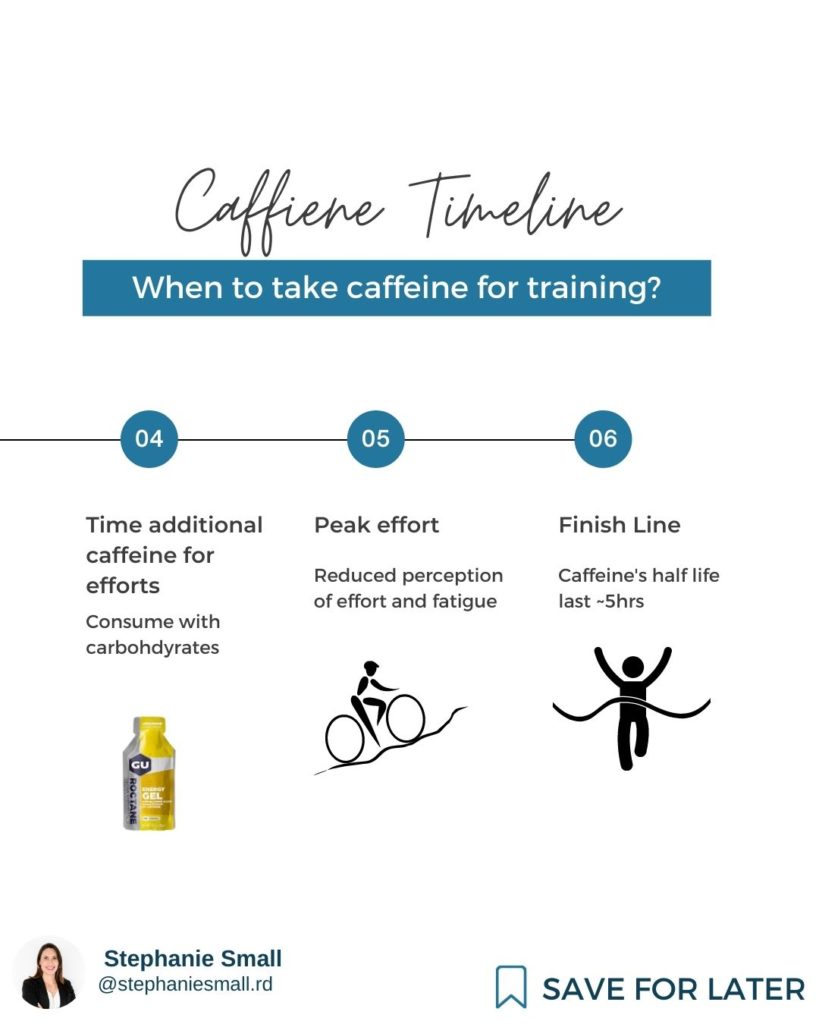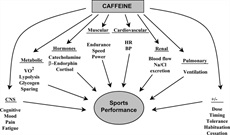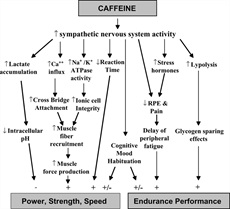Who doesn’t love caffeine, right? ☕
Caffeine is the most widely studied and used drug on the planet. It is naturally occurring in a variety of plants such as coffee, tea, and cocoa. Over 90% of U.S. adults consume caffeine on an average of 200mg/day (Fulgoni, Keast et al. 2015) .
In recent years, it has been quite the trend for physically active individuals to consume high-caffeine-containing products to get the most out of their workout.
However, chugging that pre-workout during your workout or right before may not be the best strategy.
How Does Caffeine Work
Caffeine primarily impacts the central nervous systems but also influences hormonal, metabolic, muscular, cardiovascular, and pulmonary function (Sökmen, Armstrong et al. 2008).
Caffeine is both water and lipid-soluble, which allows it to be rapidly absorbed by the gut and into the circulation. About 90% of caffeine is absorbed within 30-60 min of consumption (Maughan, Burke et al. 2018, Guest, VanDusseldorp et al. 2021).
Depending on where the caffeine goes, it will have a different effect:
Brain: caffeine will block adenosine receptors in the brain preventing the feeling of fatigue in the brain (Nehlig, Daval et al. 1992). Additionally, caffeine activated noradrenaline receptors which appear to increase the release of dopamine.
Muscle: caffeine potentially benefits the muscle by aiding muscle contraction by increasing the ability for calcium ions to move across the membrane, which is required for muscle contraction and force production (Graham 2001).
Central Nervous System: caffeine ingestion appears to reduce the perception of fatigue, effort, and muscle pain during physical activity (Nehlig, Daval et al. 1992).
Once the caffeine has been ingested, the effects can start to be felt around 20-30min after consumption. The heart rate increases, increase alertness, and potentially the jitters.
Depending on the individual, the half-life of caffeine lasts anywhere from 1.5-9hrs, but the average is ~5hrs. At that point, the effects start to wear off. Therefore, it is important to reduce caffeine intake around 2 pm to avoid negative implications on sleep (Maughan, Burke et al. 2018, Guest, VanDusseldorp et al. 2021).
Caffeine Recommendations
Caffeine dosage should stay within 3-6g/kg of bodyweight to positively impact performance(Graham 2001, Maughan, Burke et al. 2018, Guest, VanDusseldorp et al. 2021). Dosages higher than 6g/kg of body weight don’t see further performance improvements and can start to increase the chance of negative side effects such as anxiety, elevated heart rate, or even heart palpitations in some.
Minimally effect does of caffeine is currently unestablished, but positive benefits have been established at as low as 2mg/kg body mass.
Dosages higher than 6 mg/kg of body mass don’t appear to add additional benefits to performance. Intake of 9 mg/kg body mass is associated with a higher incidence of negative side effects such as anxiety and heart palpitations.
An additional consideration is the habitual effect of caffeine intake. Habitual caffeine user tends to have a damped effect in their response to caffeine. This can lead to increased consumption that may not provide additional benefits and no impact on exercise performance.
If your goal is to use caffeine for its ergogenic effects, then it is important to take breaks in caffeine usage.


Caffeine and Sports Performance
The benefits of caffeine to act as an ergogenic aid in sports performance take on a variety of different mechanisms to contribute to the impact of performance (see figure 3).

The effects of caffeine on body systems and sports performance; ref: (Sökmen, Armstrong et al. 2008)
The effects of caffeine on body systems and sports performance; ref: (Sökmen, Armstrong et al. 2008)
In endurance sport, caffeine appears to improve performance by:
- Increases fat metabolism to have a glycogen sparing effect
- Increase the release of stress hormones such as cortisol which reduces the perception of pain and fatigue
- Improved cognitive mood.
In power and speed sports, caffeine appears to improve performance by:
- Improve muscle contraction through calcium ion mobilization
- Reduce reaction time and increase alertness
- Increase muscle fibre recruitment which increases total force production
- Improve cognitive mood.

Potential mechanisms of caffeine in endurance and power events; ref: (Sökmen, Armstrong et al. 2008)
Potential mechanisms of caffeine in endurance and power events; ref: (Sökmen, Armstrong et al. 2008)
Below are both the @internationalolympiccommitteef and @the_issn position stands on caffeine and athletic performance.
PMID:29540367, 33388079
Everyone responds to caffeine a little differently, so you must find what works for you!
Keep in mind that caffeine has a reduced affect if used chronically.
👇 Comment below your favourite pre-workout!
References
Fulgoni, V. L., 3rd, Keast, D. R., & Lieberman, H. R. (2015). Trends in intake and sources of caffeine in the diets of US adults: 2001-2010. Am J Clin Nutr, 101(5), 1081-1087. https://doi.org/10.3945/ajcn.113.080077
Graham, T. E. (2001). Caffeine and exercise: metabolism, endurance and performance. Sports Med, 31(11), 785-807. https://doi.org/10.2165/00007256-200131110-00002
Guest, N. S., VanDusseldorp, T. A., Nelson, M. T., Grgic, J., Schoenfeld, B. J., Jenkins, N. D. M., Arent, S. M., Antonio, J., Stout, J. R., Trexler, E. T., Smith-Ryan, A. E., Goldstein, E. R., Kalman, D. S., & Campbell, B. I. (2021). International society of sports nutrition position stand: caffeine and exercise performance. J Int Soc Sports Nutr, 18(1), 1. https://doi.org/10.1186/s12970-020-00383-4
Maughan, R. J., Burke, L. M., Dvorak, J., Larson-Meyer, D. E., Peeling, P., Phillips, S. M., Rawson, E. S., Walsh, N. P., Garthe, I., Geyer, H., Meeusen, R., van Loon, L. J. C., Shirreffs, S. M., Spriet, L. L., Stuart, M., Vernec, A., Currell, K., Ali, V. M., Budgett, R. G., . . . Engebretsen, L. (2018). IOC consensus statement: dietary supplements and the high-performance athlete. Br J Sports Med, 52(7), 439-455. https://doi.org/10.1136/bjsports-2018-099027
Nehlig, A., Daval, J. L., & Debry, G. (1992). Caffeine and the central nervous system: mechanisms of action, biochemical, metabolic and psychostimulant effects. Brain Res Brain Res Rev, 17(2), 139-170. https://doi.org/10.1016/0165-0173(92)90012-b
Sökmen, B., Armstrong, L. E., Kraemer, W. J., Casa, D. J., Dias, J. C., Judelson, D. A., & Maresh, C. M. (2008). Caffeine use in sports: considerations for the athlete. J Strength Cond Res, 22(3), 978-986. https://doi.org/10.1519/JSC.0b013e3181660cec
